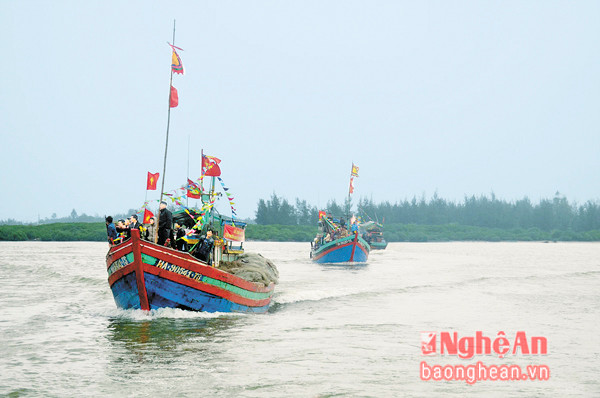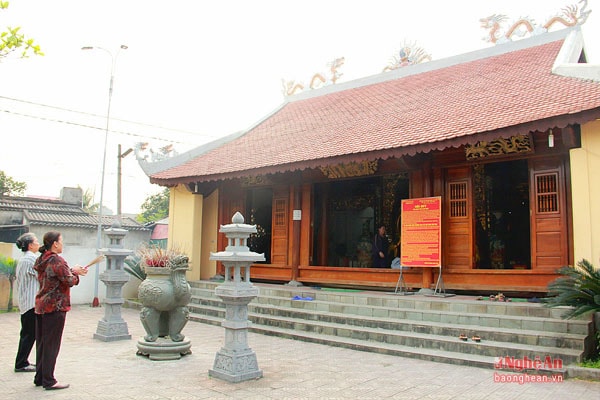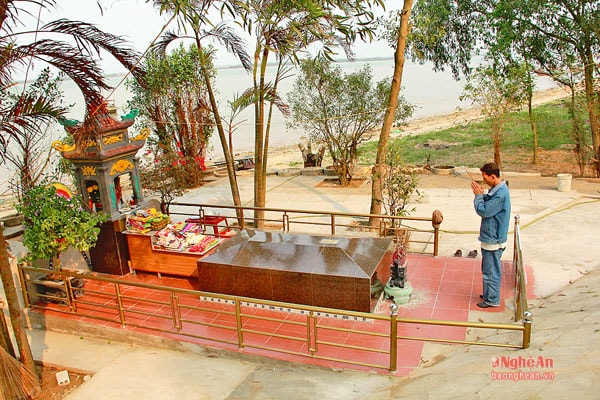Whales washing ashore is a good omen in fishermen's beliefs.
(Baonghean.vn) - Along the 82 km coastline in Nghe An, there are many spiritual structures related to the worship of Whales.The virtue of rescuing fishermen in distress on their journey to conquer the oceanand there are many places where dead whales wash ashore. Fishermen in these coastal areas still believe that the story of whales washing ashore is a good omen for the fishing village.
On May 25, a giant whale ran aground on the coast of Dien Thinh commune, Dien Chau district. Authorities and local people successfully rescued it and released it back into the sea. On May 27, fisherman Dien Thinh reported that he discovered a whale carcass about 1km from shore, already decomposed. A working group from the Department of Agriculture and Rural Development of Nghe An province is approaching the dead whale carcass to handle it. |
 |
| The fleet participates in the fishing ceremony in Dien Ngoc commune (Dien Chau). |
I can’t remember how many times I’ve set foot in Lach Van estuary. Every time I return to this land, the strong fishy smell of seafood lingering in the hamlets along the creek still makes my heart flutter with a feeling of both familiarity and strangeness. The creek, less than ten kilometers long, embraces and nurtures countless lives born and raised here. The tolerant sea gives people seafood but also hides countless lurking dangers. And the residents of Lach Van sea have forever been grateful to the sea, grateful for the miracle of the whale that saved them from disasters in the middle of the ocean.
The whale worship of the coastal residents of Dien Chau district has existed for a long time, occupying a special place in the spiritual life and beliefs of the fishing community. According to legend, on a stormy day in the early 18th century at Lach Van estuary, when the fishermen on the ship in distress were struggling with strong winds and waves, a giant whale suddenly appeared, attached itself to the side of the boat and pushed the boat to the shore of Ly Nhan village (now Dien Ngoc commune). After rescuing the fishermen, he was exhausted and died shortly after. The whole Ly Nhan village mourned and held a funeral ceremony like a relative, and built a temple to worship him in Ly Nhan village. After many changes, the temple was later demolished. The Whale Temple in Ngoc Minh village is currently the only temple in the coastal area of Dien Chau that worships the Whale. It has become a place where Dien Chau fishermen take refuge during each trip to sea. The belief that he will protect them at sea has helped them boldly go out to sea...
Having the opportunity to visit Quynh Long (Quynh Luu district), I was told many mysterious stories by the fishermen here that made me feel like I was lost in a fairy tale. The small hamlet of Phu Lien faces the East Sea, a curved flat area shaped like a sail. Anyone who has ever set foot on this land must have felt excited. On this strip of land facing the sea, there is also a small temple leaning against Hon Kien mountain.
Mr. Tran Van Trang, the temple caretaker, said that in the past, there was a giant centipede that crawled down from the mountain cave to the beach every day. No one saw it directly, but everyone witnessed the centipede's footprints on the ground. Notably, since the centipede appeared, the villagers' seafood fishing was favorable, so everyone discussed building a temple to worship the centipede god. That is why the temple was named Ret Temple. After many changes, the temple was demolished and later when business was not favorable, the people of Phu Lien discussed rebuilding the temple. Although the new temple is not as majestic as before, it is a place for spiritual activities of the local residents. What is special is that Ret Temple is also where fishermen worship the Whale with the hope of being blessed by him on each trip to sea. Next to Ret Temple, there is also the whale's grave, which was carefully reburied and built by the residents when he landed on this sacred land.
Mr. Ho Xuan Tri - Deputy Head of Dai Bac village said that, up to this point, no one remembers exactly when the grave was built, but everyone here knows the story of the whale that was washed ashore and was given a solemn funeral by the people along with many thrilling stories.
According to legend, in the 19th century, when he washed ashore, many people tried to bring him ashore for burial, but because he was too big, they could not. With no other choice, people decided to cut his flesh to get his bones for burial. According to legend, this whale was 120m long, and his body from belly to back was nearly 5m high.
After he rested in Dai Bac for 2-3 years, the villagers saw that business was increasingly favorable, sailing smoothly, so they built a temple. At first, the temple had only 1 building, 5 years later, the temple was renovated and built into 3 buildings, each building had 3 rooms and this was one of the largest temples in Nghe An at that time. The temple was consecrated by the Nguyen Dynasty Kings. The local people still pass on some quite thrilling stories about the sacredness of this temple associated with some events that took place locally in 1970...
 |
| Hieu Village Temple worships the whale god. |
In the Cua Hoi sea area, the residents here also tell each other the story of a merchant ship owner who specialized in helping the poor and was saved by a whale. Once upon a time, there was a merchant who often did charity work. He and his fleet traveled everywhere, from the South to the North to trade and earn money to help the poor. One day, on the way back, his boat was robbed and he fell into the sea. The merchant was floating in the rough waves when a large fish swam by and clung to him. At midnight, the whale leaned over and let the merchant ashore. To show his gratitude, he hired people to build a house and a business in this land (now Cua Hoi) and often picked up the whale's body that drifted ashore to bury and worship it carefully.
The custom of worshipping the Whale God has existed for a long time. In the minds of Cua Hoi fishermen, the Whale God is the guardian deity when they go to sea. It is impossible to remember how many whale corpses have been recovered here, but Cua Hoi people often whisper to each other that in the past, this sacred land was protected by a whale as big as a ship. Whenever boats encountered trouble, big waves and strong winds, help appeared. When the Whale God died and drifted ashore, it took 30 pairs of mats to cover it all. In Cua Hoi area, in addition to Lang Hieu Temple worshiping the Whale God with 97 fish graves, there are other graves in the fishing villages here.
The beginning of the new year is an occasion for Nghe An residents to show their respect for Whales, the most unique of which is the Fishing Festival. The Fishing Festival originates from the Whale worship custom of coastal residents, a spiritual activity with the wish to pray for a new year of favorable weather, calm seas, smooth sailing for fishermen, and high productivity. This is also an opportunity for people to encourage each other to stick to the sea, helping local people to be closer to each other, unite, and build a meaningful cultural lifestyle.
 |
| People burn incense at the whale grave in Nghi Xuan commune (Nghi Loc). |
Nghe An province currently has nearly 10 temples and shrines worshiping Whales stretching from Hoang Mai town to Cua Hoi. Of which, Quynh Luu district has the largest number with 5 temples and shrines, mainly concentrated in the communes of Quynh Tho, Quynh Long, and Tien Thuy. In addition, every year many localities organize the Fishing Festival, some places organize the ceremony very solemnly, the scale goes beyond the locality, attracting thousands of people and tourists to participate. This is a unique cultural feature of Vietnamese fishermen in general and Nghe An fishermen in particular.
The belief in the homeland sea where fishermen are supported helps fishermen overcome all difficulties and continue to go out to sea. And, the fishermen's desire to go out to sea seems to be strengthened when the State has a mechanism to support and encourage the construction of large-capacity ships, especially when Decree 67/2014/ND-CP dated July 7, 2014 of the Government was issued. The policy of supporting fishermen to borrow preferential credit has created leverage to increase the capacity and ability to catch seafood at sea. In recent times, many large ships have been launched, bringing confidence and hope to every fisherman...
Thai Orchid - Vuong Van
